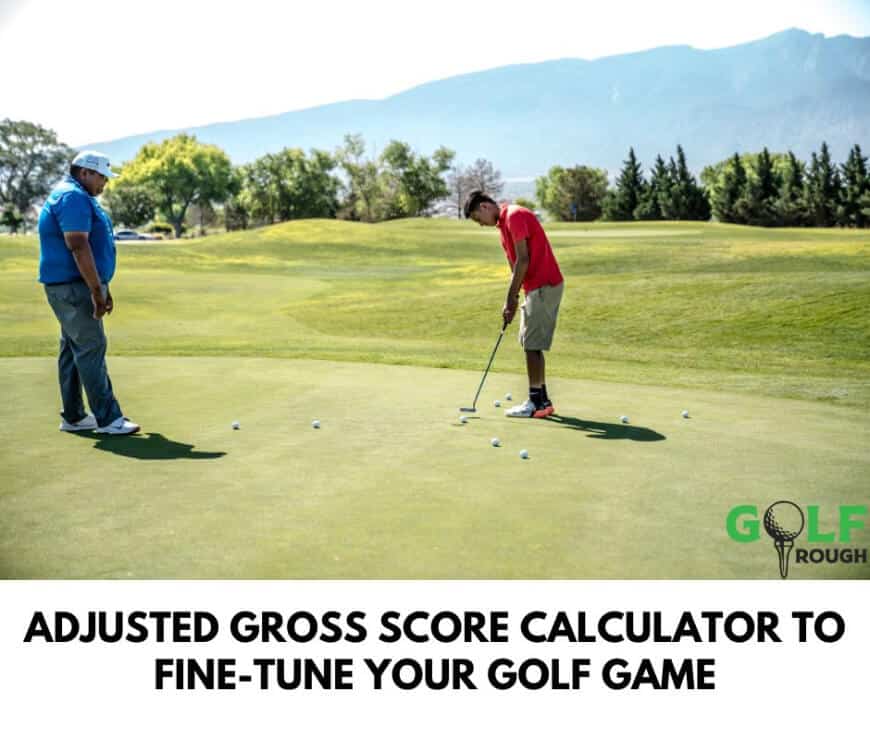Golf is a sport that demands strategy, precision, and a deep understanding of the abilities. Avid golfers must keep track of their performance to gauge improvement and bring fair competition to the game. Among all, when it comes to the handicap golf system, it is crucial to understand the adjusted gross score figures.
The World Handicap System, or WHS, calculates the adjusted gross score using a calculator after hitting a hole. This calculation helps better determine where a player stands regarding his performance. So, this gross adjusted score calculator has become an essential part of the game over the past few years. You would often hear about it when playing or watching golf. It helps you improve your certain bad shots for a better handicap score.
The article below will discuss an adjusted golf score and how it helps in a game.
Define Adjusted Golf Score
The World Handicap System, which came into being on the 1st of January 2020, started the Adjusted Gross Score calculations. But since then, its method has changed a little to make it easier for golfers to improve their game.
The adjusted golf score is the total number of strokes a golfer plays during a round adjusted with equitable stroke control modifications. The WHS states that the AGS will help the struggling player with some freedom and advantage when having a bad day at golf for specific holes. Players will often escape some bad shots played during the game.
One or two good hole shots will not significantly impact the handicap and overall golf score. As a result, this system only focuses on offering averages in the game.
What Is An Adjusted Gross Score Calculator?
The adjusted gross score calculator or AGS calculator is a tool to help you with your golf game evaluation. You can use it to know where you stand currently in the game. After playing a few shots, add your scores to the calculator.

It will use them to show your adjusted gross score through your handicap’s help. Every organization uses this calculator in one way or the other to find out the handicap index. But if you know how to use it, you can easily make your calculations.
Why Do We Use the Adjustable Gross Calculator?
The Adjusted Gross Score Calculator is a sophisticated tool designed to help golfers determine their AGS fast and correctly. This calculator is helpful for players who compete in handicapped competitions or keep a handicap.
The calculator calculates a fair and equitable AGS based on a player’s course handicap and the ESC modifications. This score then helps to compute the player’s handicap index to measure their overall ability level and offers fair comparisons with other golfers.
Why Is An Adjusted Golf Score Important In Golf?
The adjusted gross score is vital in the golf world for different reasons. It helps in promoting fairness and equality in handicapped tournaments. This ensures that players of varying skill levels can now equally compete. If there aren’t any score adjustments for ESC, those with higher handicaps will have a considerable advantage.
Their time-to-time blow-up holes can impact their final scores, again as an upper-hand advantage to them. So, the AGS system evaluates the player’s performance based on its potential instead of its mishaps.
Besides that, it helps in calculating a golf player’s handicap index to determine their golf-playing abilities or skills. The handicap index allows golfers to compete with other players with their skill level. As a result, they can play friendly matches with an equal playing opportunity. They can set individual real-time goals for improvements since the handicap index can evolve with the game.
If you need improvement with overall net and gross scores, you must have good playing equipment with improved holes score. Once you are able to understand the importance of an adjusted gross score, it will help you calculate your handicap index.
Net Score vs. Gross Score
When discussing the gross score, most golfers often come across the common phrase, the net score. The gross score means the number of strokes you play during the game. So, if you play 85 with a par 70 course, the gross score here will be 85. But with a handicap of 12, the net score would become 73.
So, if you make an estimation, the net score here will be the total strokes you left after subtracting the handicap. This idea of the net and gross score brings the golfer on par with every other player having the same fair play chances. The lower the handicap index, the more a player would need consistency.
But when it comes to certain competitions, organizers often use the net scores to divide golfers into different teams. So, playing the best ball or other golf variants during a casual match helps equal team matching.
After the competition ends, they subtract every golf player’s handicap from the gross score to determine the net score. The resulting overall net score means their alignment with the top five players. Even after playing a 90, the net score can still be close to 70 and 80 for the game.
Calculations for Finding the Adjusted Gross Score
The adjusted gross score is a basic and crucial value you need to find out for calculating the handicap index. It would help you greatly in calculating different handicaps which you would need. Above that, it can make it easier to understand your skills while playing on the golf course.
Although high-handicappers with higher scores work their way to those with lower handicap scores, their adjusted gross score enables them to compete with other professional or experienced golf players. It becomes possible through the subtraction of handicaps to get close to the top-ranking players.
Moreover, you can calculate every hole individually. Suppose you play eight strokes to the hole, listing five at the maximum for each hole; here, leave the additional three strokes and calculate only the five leftover strokes.
The Formula for Adjusted Gross Score
To understand the formula for finding the adjusted gross score, you must understand the course handicap of that particular golf course first. Once you find the golf course handicap, look for maximum shots toward each hole.
No matter how many handicap strokes you will play, the maximum limit should be the scorecard’s hole stroke limit. Often it is a net double bogey or only two shots at a par. The maximum score varies over handicap, allowing you to finish the hole.
Checkout the below basics for each handicap level:
0-9, Double Bogey
10-19, 7 on hole
20-29, 8 on hole
30-39, 9 on hole
40 above, ten on hole
The formula for calculating an AGS is as follows:
AGS = Gross Score – (Par + 2 + Handicap Strokes)
- Gross Score: The golfer’s total score for the round, including all strokes taken.
- Par: The number of strokes that a bogey golfer is expected to take on each hole.
- Handicap Strokes: The number of strokes that the golfer is allowed to take on each hole based on their handicap index.
For example, if a golfer shoots a gross score of 80 on a par 72 course, their AGS would be calculated as follows:
AGS = 80 – (72 + 2 + 0) = 76
The golfer’s AGS would be 76, because they received no handicap strokes on any holes.
Here is another example of an AGS score with handicap strokes:
- Gross Score: 85
- Par: 72
- Handicap Strokes: 1
AGS = 85 – (72 + 2 + 1) = 77
The golfer’s AGS would be 77, because they received 1 handicap stroke on one hole.
Here is a table of some other examples of AGS scores:
| Gross Score | Par | Handicap Strokes | AGS |
| 80 | 72 | 0 | 76 |
| 85 | 72 | 1 | 77 |
| 90 | 72 | 2 | 79 |
| 95 | 72 | 3 | 82 |
| 100 | 72 | 4 | 86 |
FAQs
1. Do Nine Holes Rounds Count for Handicaps ?
The 9-hole rounds do count for various handicap purposes. Golfers can easily use them to set up and maintain the handicap index like 18-hole rounds. Most golfers with limited 18-hole course access or time constraints prefer playing 9-hole rounds for quick and easy management.
Besides that, they are an excellent way to track their handicap progress along with maintaining it. They come in handy, especially when their ability to play 18-hole rounds is limited. 9-hole scores can support fair and competitive play among golfers with different abilities, whether a quick round after work or a leisurely game on a smaller course.
2. How Can We Calculate the World Golf Handicap ?
It is easy to calculate the world golf handicap using the same method as most golfers for calculating the index. But still, they have a different software set that only takes the last eight scores from the 20 submitted scores.
It won’t be easy to understand their method as a beginner, but as time passes and you gain more experience, it becomes easier. You still need to submit the scores equal to the 54 holes for an average score.
3. How to Calculate the Handicap Index ?
The calculation of the handicap index is a way of measuring the performance of a golfer about how good he is performing. So, you first need to start playing a few golf rounds. During playtime, remember to keep track of your scores. Next, find out the course and slope rating of each course you play. Now, choose your best scores from the recent rounds and use the Handicap index formula for calculations.
The formula will consider your slope rating, course rating, and scores. The lower the handicap is, the better golfer you will be. This method works best for golfers who compete together but have different sets of abilities. Remember to keep practicing with more rounds for a change in the Handicap index.
4. How to Calculate an Adjusted Gross Score for Handicaps ?
The calculation of the adjusted gross score for handicaps is very easy. You have to start by playing a golf round. Keep a note of the strokes that you will play for each hole. Next, check the course handicap using the calculator or on the scorecard. Look to the equitable stroke control or (ESC) limits according to your handicap.
Now adjust your score to the maximum for each hole with equitable stroke control. Next, add all the adjusted scores to get the adjusted gross score. This score will calculate the handicap index to show how good you are as a golf player. Remember that the ESC can help to make it fair for players of different skill levels.
5. What Does A 14-Handicap Mean In Golf ?
The handicap number tells how skilled you are and how many strokes you can shoot above par. A 14 handicap means you are a moderately skilled golf player. With 14 handicaps, you can shoot 14 more hits compared to a skilled golf player. It also helps in providing a level playing field during a competition.
But as the handicap declines, the skills start to improve. So, the lower the handicap, the better the golfer you are. It means you still have room for improvement despite having some experience.
6. What Is 7.5 Percent of an Adjusted Gross Golf Score ?
If you want to find the 7.5 percent of an adjusted gross score, first, you must have a value of the adjusted gross score. For instance, if it is 80, you can use the simple formula:
7.5 * 80 / 100 = 6
So, 6 will be your 7.5 percent of 80 adjusted gross score. This means six strokes will equal 7.5 percent of your adjusted gross score. You may use it for different purposes. It can include comparing performance or the calculations of tournament deductions.
7. How Can We Calculate Adjusted GTI ?
Calculating the adjusted gross is simple and requires a formula. You must gather all the income sources received and subtract the applicable deductions to calculate it. The sum will show your adjusted GTI.
Conclusion
An adjusted gross score calculator is a necessary and useful tool used by golf players. It helps them increase their performance and make a fair skill comparison with other players to participate in handicap tournaments.
As a result, the adjusted gross score can help the golfers calculate their handicap index. It further ensures a healthy competition factor by playing a key role. So, whether you are a seasonal golf player to fine-tune your skills or a professional player understanding and using the adjusted gross score calculator is equally necessary. Use this tool to track your progress and enhance your skills for better game play.
Matt Stevens is the founder of Golfrough.com. He holds a Postgraduate in Sports Marketing and has played golf since he was four years old. Having experienced every high and low golf has to offer, his writing helps the average golfer avoid the mistakes he has made in 28-years on the course.


Great article! I’ve been trying to fine-tune my golf game for a while now and this calculator is a great help.
Please correct your example AGS = 80 – (72 + 2 + 0) = 76 does not add up!